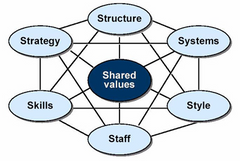Peters and Waterman, ‘In Search of Excellence’
The following quote is from another of the 20th century’s most significant management best sellers, Tom Peters and Robert Waterman’s 1982 classic, In Search of Excellence. Its management philosophy stands in poignant contrast to the quote from Ford’s Life and Work. The context for Peters and Waterman’s book was a prevailing sense of malaise in the American economy, and a sense of being beaten by the Japanese in the game of economic growth and prosperity. Their response is a subtle one, taking heed of Japanese management lessons yet defending the American management record. Americans, Peters and Waterman say, can be as good as or better than the Japanese. Peters and Waterman characterise post-Fordist management, as learnt in the late 20th century from the ‘Japanese model’.

We hear stories every other day about the Japanese companies, their unique culture and their proclivity for meeting, singing company songs, and chanting the corporate litany. Now, that sort of thing is dismissed as not relevant in America, because who among us can imagine such tribal behaviour in U.S. companies? But American examples do exist. For anyone who has not seen it, it is hard to imagine the hoopla and excitement that attend the weekly Monday night rally of people who sell plastic bowls—Tupperware bowls. Similar goings on at Mary Kay Cosmetics were the subject of a segment done … on Sixty Minutes. These examples might be dismissed as peculiar to selling a certain kind of product. On the other hand, at Hewlett Packard, the regular beer bust for all hands is a normal part of each division’s approach to keeping everyone in touch. And one of us went through an IBM sales training program early in his career; we sang songs every morning and got just as enthusiastic (well, almost as enthusiastic) as the workers in a Japanese company …
What really fascinated us as we began to pursue our survey of corporate excellence was that, the more we dug, the more we realised the excellent companies abounded … We began to realise that these companies had cultures as strong as any Japanese organisation … Whatever the business, by and large the companies were doing the same, sometimes cornball, always intense … things to make sure all employees were buying into their culture—or opting out …
There is good news from America. Good management practice today is not resident only in Japan. But, more important, the good news comes from treating people decently and asking them to shine, and from producing things that work. Scale efficiencies give way to small units with turned-on people. Precisely planned R&D efforts aimed at big bang products are replaced by armies of dedicated champions. A numbing focus on cost gives way to an enhancing focus on quality. Hierarchy and suits give way to first names, shirtsleeves, hoopla, and project based flexibility. Working by fat rule books is replaced by everyone’s contributing. Even management’s job becomes more fun. Instead of brain games in the sterile ivory tower, it’s shaping values and reinforcing through coaching and evangelism in the field.
Peters, Thomas J., and Jr. Waterman, Robert H. 1984. In Search of Excellence: Lessons from America’s Best-Run Companies. New York: Harper & Row, Publishers. pp. xx,xxi–xxii,xxv. || Amazon || WorldCat
